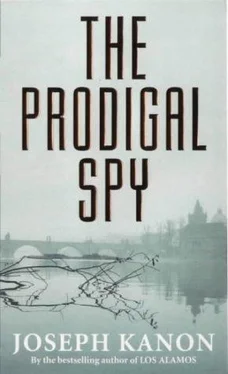“Don’t leave me,” she said softly.
“I’m not leaving you.” He took her face in both hands. “Help me. I’ve got to settle this. I don’t want to have to worry about you.”
“They don’t want me.”
“They will. It’s dangerous, if they find out about you and Foster.” He stopped her lips with his finger. “It’s dangerous for me.” A beat. “You’d be a liability.”
She stared at him, then turned away. “Are you telling me the truth?”
“Promise me,” he said, bringing her eyes back.
“What if it doesn’t work? With Zimmerman.”
“Then I’ll call Foster for help. I promise.” He leaned over and kissed her. “I’ll be there. It’ll be all right. But you have to leave now. Do you understand?” She nodded slowly. “Good.”
She leaned over and took a cigarette from the night table. “I don’t want to be a liability,” she said, an edge in her voice.
“You’re not,” he said, knowing he should say more. But there wasn’t time. He got up and put on his jacket.
“But it was because of me,” she said, brooding, “that he was-you know.”
“No, not because of you. Don’t think that.”
“But Jeff called Washington. It’s the same thing, isn’t it? Your father knew.”
Nick stopped. “No. I don’t see how he could have.”
“Then why did he change his plans?”
A wrinkle, something that didn’t fit. “I don’t know,” Nick said slowly, standing still.
Molly looked up, watching him. “You’d better go if you’re going.” A small smile. “You’ve mussed your hair.”
He picked up the raincoat and went into the bathroom, slipped the urn into the folds of the coat, and ran a comb through his hair. No time.
When he came back, she was still sitting there, looking at nothing. He leaned over and kissed her forehead, the coat awkward under his arm.
“Promise me?” he said, and when she nodded again, he whispered, “Okay. I’ll see you in Germany.”
At the door he turned, and for a moment he wondered if this was how his father had felt leaving, the small lie, sure he could make things right later.
She looked back at him, smiling ironically. “ Auf wiedersehen,” she said.
He went down the back stairs, passing a chambermaid on her way up. The lobby was impossible-Zimmerman’s men would stick to him now-but there seemed to be no back door, just a long corridor leading to the kitchen, breakfast trolleys lined up outside, waiting to be delivered. A white-jacketed boy with a tray came out, looking at him curiously, so he went into the WC, locking the door behind him. The window was high, but large enough. If he climbed onto the sink he could reach it, then slither out to the back street. He stopped. He saw himself, feet dangling, dropping onto the pavement, amazing everyone in the street, a comic scene from a silent movie. Keep calm. The easiest way to be invisible was to be ordinary.
He went into the kitchen, all steam and banging pots, pretending to be lost. “ Vychod?” he said to a girl folding napkins on a tray, a word he’d seen on exit signs, hoping he was pronouncing it properly. She giggled, either at his Czech or his hapless sense of direction, and cocked her head toward the end of the steam table. A fire door, half open to let in some air. Then he was on the street behind the hotel, just another morning walker, not even worth a glance.
He walked up the hill toward the university, not bothering to switch back on side streets, invisible because he had nothing to hide. At the station there was the same rush of commuters pouring out of the art nouveau arch, the same uniformed policemen standing guard, part of the scene, no more threatening than mailboxes. He bought a copy of Rude Pravo and went into the station cafe. When he handed over the Czech crowns for coffee, he wondered if there was a currency form for leaving the country, a mirror of the exchange document coming in, some small thing to trip him up. But crowns were worthless in the West; why would they care? Still, a detail he hadn’t considered. How many others? Czechs walked literally through a minefield to the wire. Why did he think he could ride out with a ticket and a visa and a Western face, as if it were another stroll through the Alcron’s kitchen? He took a table near the far end of the cafe window and tried to imagine everything that might happen, his face bent to the newspaper.
From his angle at the window he could see part of the big hall and the long row of platforms. The same ticket window and news kiosk, people hurrying across the floor. No one loitered. The same platform, marked BERLIN-PRAHA-WIEN, still empty. Next to it, a short train had pulled up, but the doors opened only on the right, to another platform, as if the boxy-suited commuters couldn’t be trusted to mix with international passengers. Then Nick saw that they were handing in ticket stubs to a conductor at the gate. Not a plot; simple crowd control, to ease the morning rush. He sipped his coffee and looked at his watch. Molly would be at the embassy now, safe. A maid would be making up their room, maybe sneaking a look at the Lenin medal on the desk, everything still there, as if they were just out for the morning.
He was on his second cup of coffee when he saw the men. There were two of them, not in uniform but with the unmistakable swagger of policemen, ready to take charge. They spoke briefly to one of the attendants, then placed themselves at the entrance to the Vienna platform, waiting. For a moment Nick thought they were meeting someone. But when the first passengers arrived, a family with innumerable suitcases, he saw that they were acting as a checkpoint. They examined the father’s papers, then waved him onto the empty platform. This was something new. The other morning no one had stood guard at the gate. Were they looking for him? He told himself not to panic. In a police state, everybody was guilty of something. There could be a hundred reasons for a passport check. They couldn’t know yet that he was leaving.
He watched them pass another man through with a bored wave, then a third. Maybe it was a routine security check, a morning assignment no one wanted, their bad luck to come up on the duty roster. But it wasn’t a routine morning.
Nick was unaccounted for. Even if they were looking for someone else, they would notice him, remember him later, an unexpected risk. How long before the train got to the border? If they were looking for him, it wouldn’t matter. He thought of the other train pulling out, leaving his father behind. His eyes darted around the platform, which was beginning to fill up. There had to be a way.
“Nick.”
When he turned, startled, he saw only thighs, barely covered by a miniskirt, then the blouse and her worried face.
“Zimmerman came to the hotel to see you,” she said, explaining herself. She sat down.
“What did you say?”
“I said you’d gone to see him, to sign the statement.” She took a sip of coffee. “But you didn’t.” A reproach.
“No.”
“Why didn’t you tell me?”
“Does he know I’m here?”
She shook her head. “I said he’d probably just missed you. Or you went to see Anna first.”
“Good.” But how much time did that buy? Then he looked up at her. “How did you know?”
“You took the urn. So-” She let it go, shrugging her shoulders. “‘I’ll meet you in Waldsassen,”’ she said, sarcastic.
“I will. I told you.”
“You tell me lots of things.”
“Molly, there isn’t time for this. I will meet you there. Go to the embassy.”
“And bum a ride from Jeff? I’ve already got one,” she said, tapping her shoulder bag. “The ticket’s still good, isn’t it?”
“You don’t understand. It’s serious. The security police may be looking for me.”
Читать дальше












